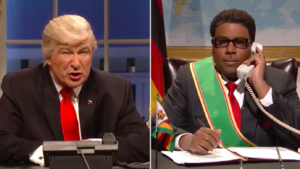During the cold open this weekend, Alec Baldwin, who plays Trump, sits in the Oval Office speaking with Steve Bannon, his chief strategist. After complaining that he was “tired and cranky†and feeling like “I could freak out on somebody,†Bannon suggests calling Australia. And as with previous shows, Bannon was presented in a cloaked skeleton as the grim reaper. Baldwin also makes equally unsatisfactory calls to Mexico’s president and Germany’s chancellor.
But the show’s climax moment came when the Bannon character tells Baldwin to “call some random little country and show them who is boss.†After calling Zimbabwe’s president, played by Kenan Thompson, Baldwin says, “Zimbabwe, there’s a new sheriff in town.â€
Of course, in real life, president Robert Mugabe has been the “sheriff†in his own country since 1980. At 92 years of age, he has the distinction of being the world’s oldest president and is one of Africa’s longest-standing leaders. During his tenure, the country has faced serious economic challenges, with currency collapses that have seen Zimbabweans sleep outside banks at night just to access their cash. Mugabe’s government has cracked down on and arrested those protesting the deteriorating situation across the country.
But during the 2016 US elections, Mugabe appeared to root for a Trump presidency. During a meet with US officials, he reportedly said that once Trump was president, “you’ll wish you’d been friendlier to me.†The United States imposed sanctions on Zimbabwe in 2001 for its increasing assault on human rights and the rule of law.
In the skit, after confirming that the caller was Baldwin, Thompson acting as Mugabe asks, “You think you are a real dictator?†Comedians like Trevor Noah have in past compared Trump to African strongmen, calling him “America’s first African president.â€
Thompson continued: “I will rip out your spine and drink from your skull. You cannot even walk down stairs, you little white b—. Don’t you ever call Zimbabwe again.â€
Whenever Kampire Bahana, a Ugandan writer and DJ, walks into a salon the experience is the same. “They ask me what I’ve been doing with my hair, and no matter whether my hair is in braids or what, they tell me what I’m doing is wrong.â€
Bahana and three of her friends are working to negate experiences like this in their pop-up salon and art installation focused on black hair, Salooni, named after what hair salons are called in Uganda. “Most women battle with their hair because all of us live in a society that profits from our insecurities,†she says. “For black women, the extra layer is our interaction with colonialism in Africa and generally trying to achieve a standard of beauty, which is white and completely unobtainable.â€
At Salooni, visitors have their hair done for free by professional stylists. They can get a massage, play with other people’s hair, or browse the photographs, video, and performances that are part of Salooni’s growing collection of research and art celebrating black hair. The stylists and visitors discuss things like braiding tips for keeping one’s hair moist.
“We’re trying to consciously create a space where we practice care for one another,†says Darlyne Komukama, a photographer and one of the project’s cofounders.
Salooni’s goal is to treat African hair as as a science, culture, and art— a “site of knowledge†to study everything from fractals, patterns that repeat at varying scales in African hairstyles, to how cornrow braiding was an act of resistance was an act of resistance among slaves. “Definitely African hair care hasn’t ben given the credit that it deserves,†Bahana says.
Salooni, started last year at an arts festival in Uganda, will be touring in Kigali and London this year thanks to a grant from the British Arts Council. The project comes at a time when the natural hair movement, born in the US in the early 2000s, has become even more prevalent online. These ideas have made inroads in African countries as well. Bahana notes the number of new natural hair salons, products catering to natural hair and online groups that she’s seen in the countries she’s visited. (Salooni doesn’t only celebrate natural hair, Bahana adds, stressing that anyone is welcome.)
The issue of black hair is especially fraught in parts of the continent. In South Africa, several high schools ban girls from wearing their hair naturally, a blatantly racist dress code that only drew attention once a 13 year old girl began protesting. In Uganda, many schools demand that black female students shave their hair if it can’t be kept “neat,†according to Bahana. Yet, girls of white or Asian descent can wear their hair naturally.
For the Salooni cofounders, the project is as much about the practicalities of black hair care as it is about the varying history that hair tells about lives of African women through the ages. Billions of dollars have been pumped into the black hair care industry in the research and marketing of things like hair relaxers, which in Bahana’s opinion are more damaging than helpful. “We are very poorly educated about how to care for black hair,†Bahana says. “It’s only now… that we’ve started sifting through what we’ve been taught and what [practices] we want to keep and what we don’t want to keep.â€
Post published in: Featured


